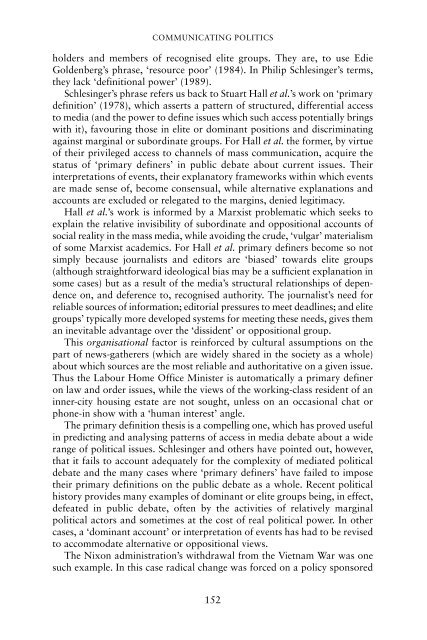20130412164339753295_book_an-introduction-to-political-communication
20130412164339753295_book_an-introduction-to-political-communication
20130412164339753295_book_an-introduction-to-political-communication
Create successful ePaper yourself
Turn your PDF publications into a flip-book with our unique Google optimized e-Paper software.
COMMUNICATING POLITICS<br />
holders <strong>an</strong>d members of recognised elite groups. They are, <strong>to</strong> use Edie<br />
Goldenberg’s phrase, ‘resource poor’ (1984). In Philip Schlesinger’s terms,<br />
they lack ‘definitional power’ (1989).<br />
Schlesinger’s phrase refers us back <strong>to</strong> Stuart Hall et al.’s work on ‘primary<br />
definition’ (1978), which asserts a pattern of structured, differential access<br />
<strong>to</strong> media (<strong>an</strong>d the power <strong>to</strong> define issues which such access potentially brings<br />
with it), favouring those in elite or domin<strong>an</strong>t positions <strong>an</strong>d discriminating<br />
against marginal or subordinate groups. For Hall et al. the former, by virtue<br />
of their privileged access <strong>to</strong> ch<strong>an</strong>nels of mass <strong>communication</strong>, acquire the<br />
status of ‘primary definers’ in public debate about current issues. Their<br />
interpretations of events, their expl<strong>an</strong>a<strong>to</strong>ry frameworks within which events<br />
are made sense of, become consensual, while alternative expl<strong>an</strong>ations <strong>an</strong>d<br />
accounts are excluded or relegated <strong>to</strong> the margins, denied legitimacy.<br />
Hall et al.’s work is informed by a Marxist problematic which seeks <strong>to</strong><br />
explain the relative invisibility of subordinate <strong>an</strong>d oppositional accounts of<br />
social reality in the mass media, while avoiding the crude, ‘vulgar’ materialism<br />
of some Marxist academics. For Hall et al. primary definers become so not<br />
simply because journalists <strong>an</strong>d edi<strong>to</strong>rs are ‘biased’ <strong>to</strong>wards elite groups<br />
(although straightforward ideological bias may be a sufficient expl<strong>an</strong>ation in<br />
some cases) but as a result of the media’s structural relationships of dependence<br />
on, <strong>an</strong>d deference <strong>to</strong>, recognised authority. The journalist’s need for<br />
reliable sources of information; edi<strong>to</strong>rial pressures <strong>to</strong> meet deadlines; <strong>an</strong>d elite<br />
groups’ typically more developed systems for meeting these needs, gives them<br />
<strong>an</strong> inevitable adv<strong>an</strong>tage over the ‘dissident’ or oppositional group.<br />
This org<strong>an</strong>isational fac<strong>to</strong>r is reinforced by cultural assumptions on the<br />
part of news-gatherers (which are widely shared in the society as a whole)<br />
about which sources are the most reliable <strong>an</strong>d authoritative on a given issue.<br />
Thus the Labour Home Office Minister is au<strong>to</strong>matically a primary definer<br />
on law <strong>an</strong>d order issues, while the views of the working-class resident of <strong>an</strong><br />
inner-city housing estate are not sought, unless on <strong>an</strong> occasional chat or<br />
phone-in show with a ‘hum<strong>an</strong> interest’ <strong>an</strong>gle.<br />
The primary definition thesis is a compelling one, which has proved useful<br />
in predicting <strong>an</strong>d <strong>an</strong>alysing patterns of access in media debate about a wide<br />
r<strong>an</strong>ge of <strong>political</strong> issues. Schlesinger <strong>an</strong>d others have pointed out, however,<br />
that it fails <strong>to</strong> account adequately for the complexity of mediated <strong>political</strong><br />
debate <strong>an</strong>d the m<strong>an</strong>y cases where ‘primary definers’ have failed <strong>to</strong> impose<br />
their primary definitions on the public debate as a whole. Recent <strong>political</strong><br />
his<strong>to</strong>ry provides m<strong>an</strong>y examples of domin<strong>an</strong>t or elite groups being, in effect,<br />
defeated in public debate, often by the activities of relatively marginal<br />
<strong>political</strong> ac<strong>to</strong>rs <strong>an</strong>d sometimes at the cost of real <strong>political</strong> power. In other<br />
cases, a ‘domin<strong>an</strong>t account’ or interpretation of events has had <strong>to</strong> be revised<br />
<strong>to</strong> accommodate alternative or oppositional views.<br />
The Nixon administration’s withdrawal from the Vietnam War was one<br />
such example. In this case radical ch<strong>an</strong>ge was forced on a policy sponsored<br />
152
















